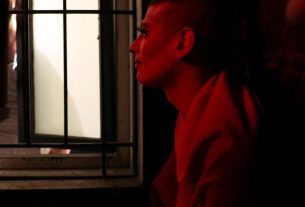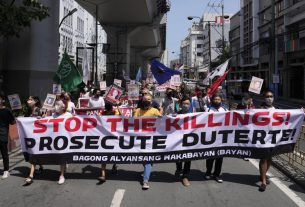(Bishkek) – A Kyrgyz court on September 17, 2025, convicted two former media workers on charges of “public calls for mass unrest”, Human Rights Watch said today. Joomart Duulatov and Aleksandr Aleksandrov, from the independent investigative outlet Kloop, were each sentenced to five years in prison. Two of Kloop’s accountants who were also convicted on the same charges were sentenced to three years of probation, meaning they will not serve jail time.
Aleksandrov and Duulatov were prosecuted because of their alleged participation in the production of five videos critical of the government and published on the Temirov Live Youtube channel run by an investigative journalist in exile, Bolot Temirov, despite Temirov’s statements that he never cooperated with these journalists and that he produced all these videos independently. Kloop’s lawyers will appeal the district court decision at the city court.
“Aleksandrov and Duulatov’s cases were marred from the outset with the prosecution failing to provide tangible evidence for their conviction,” said Syinat Sultanalieva, Central Asia researcher at Human Rights Watch. “Their verdicts appear baseless and should be vacated. They demonstrate the government’s effort to dismantle media freedom and to stifle any dissenting voices.”
Duulatov and Aleksandrov, who previously worked as camera operators for Kloop but had left the organization by the time of their arrest, were detained on May 28, 2025, along with at least six other current and former Kloop employees in a sweeping security service operation by the State Committee on National Security. Kloop had been shut down by decision of the Supreme Court in August 2024, but had continued operating through a different organization.
Security officials failed to explain the reasons for the detentions and searched the homes of the media workers without presenting search warrants, confiscating computers, cameras, equipment for live broadcasting, and phones. The authorities interrogated the detained Kloop contributors for several hours without allowing access to legal counsel and did not allow them to contact their families or colleagues.
In a Facebook post on May 29, a presidential spokesperson claimed that Temirov had paid the detained Kloop contributors to conduct “false” investigations. Most detainees were eventually released after lengthy questioning and placed under gag orders.
On May 30, the security agency released a video on its official Instagram account showing several of the detainees expressing regret for contributing to Kloop’s allegedly “destructive” activities, including cooperation with Temirov, and pledging to cease cooperation with the platform.
The trials against the four Kloop staff members started on August 6. Although all four initially pleaded guilty in court, they retracted their confessions during a hearing on September 9, citing pressure during detention and promises by the investigating officers to move them to house arrest. They further denied the charges, with their defense lawyers saying that “all the videos cited by the prosecution were published by Bolot Temirov” and that “neither Kloop Media nor the defendants themselves distributed them.”
During the four court hearings the prosecution failed to submit any evidence or technical analysis from confiscated electronic devices and financial records that could substantiate the charges. The court also ignored evidence that court appointed experts had failed to identify any calls for mass unrest in the videos, or any evidence that would connect the defendants to videos produced by Temirov and published on Temirov Live.
The judge offered no justification for her ruling, only pointing out that the four defendants had all admitted guilt during interrogation and dismissing their retractions.
The convictions follow a pattern of targeting journalists connected to anti-corruption reporting. Makhabat Tajibek kyzy, director of Temirov Live and Temirov’s wife, was sentenced on October 10, 2024, to six years in prison on the same charges. She was detained in early 2024 along with ten other journalists linked to Temirov Live during a coordinated raid similar to the one that led to the detention of the Kloop journalists. Four of them were later convicted for allegedly making “public calls for mass disorder,” with two released on probation, and one sentenced to five years in prison but later pardoned by president Japarov.
The persecution of Kloop’s staff sends a chilling message to all independent voices in Kyrgyzstan and threatens the rule of law, Human Rights Watch said. Kyrgyzstan’s international partners, particularly the European Union, should take immediate action to address this systematic dismantling of press freedom.
“The sentences against the former Kloop employees mark a dark turning point for press freedom in Kyrgyzstan,” Sultanalieva said. “President Sadyr Japarov’s government has transformed what was once a regional haven for independent media into a country where journalists face years in prison simply for doing their jobs.”



